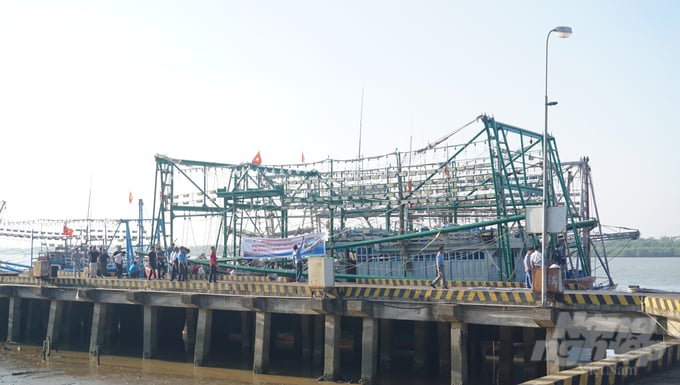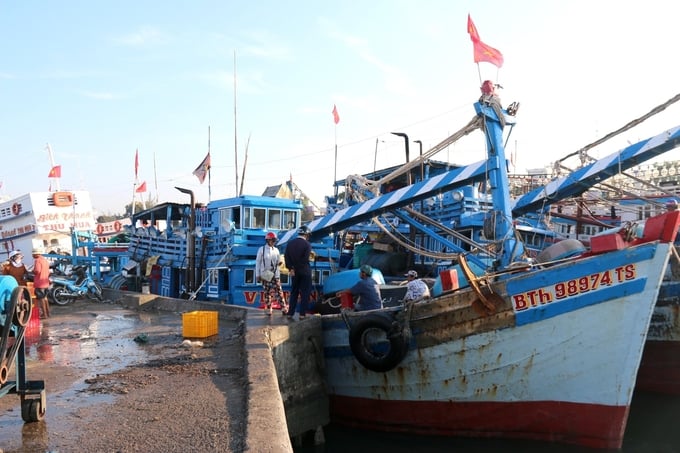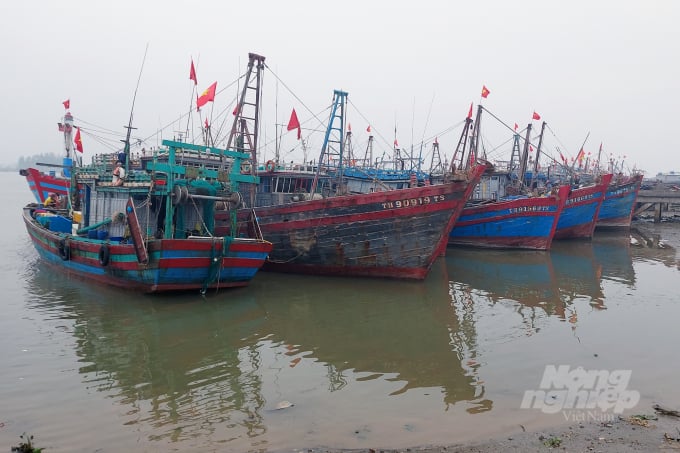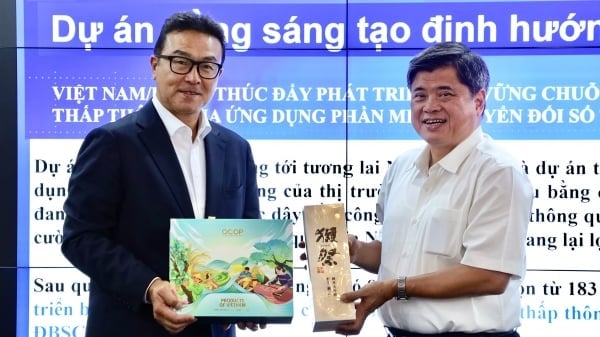May 25, 2025 | 04:37 GMT +7
May 25, 2025 | 04:37 GMT +7
Hotline: 0913.378.918
May 25, 2025 | 04:37 GMT +7
Hotline: 0913.378.918
On November 15th, in Sam Son City (Thanh Hoa), the National Agricultural Extension Center, in collaboration with the Department of Agriculture and Rural Development of Thanh Hoa Province, organized the Agricultural Extension Forum @ Agriculture with the theme: “Application of Technological Advancements in the Development and Enhancement of Fisheries Exploitation and Preservation on Fishing Vessels to Comply with IUU Fishing Regulations".
The forum was attended by representatives from various departments and centers under the Ministry of Agriculture and Rural Development (MARD), as well as nearly 200 delegates from agricultural extension centers, departments of agriculture and rural development, fishing teams, and fishermen from coastal provinces including Thanh Hoa, Nghe An, Ha Tinh, Quang Binh and Quang Tri.

Fishing vessels anchored at Lach Hoi Port (Sam Son, Thanh Hoa). Photo: Quoc Toan.
Recently, the fisheries sector has received special attention from the Government and has made significant advancements. From a fleet of outdated, artisanal fishing boats, the country now boasts more than 30.000 offshore fishing vessels with a length of 15 meters or more.
To enhance the effectiveness of offshore fishing vessels, the National Agricultural Extension Center has supported and transferred scientific and technological advancements in seafood preservation and processing to local fishermen through demonstration models and training activities. These efforts aim to improve the skills of fishermen, increase the value of their catch, and ensure that the industry meets modern standards for sustainability and efficiency.
Since 2011, the National Center for Agricultural Extension has trained and conducted ToT (Training of Trainers) for 600 individuals, and implemented 14 projects on the exploitation, preservation, and processing of aquatic products. Many of these projects have been transferred to fishermen and have shown practical effectiveness, such as: the project to build a mechanized model for the trap net fishing profession for offshore fishing vessels; the project to build a model for applying PU (Polyurethane) materials for preserving products in storage chambers on offshore fishing vessels; the project to apply CPF (Composite-Polyurethane) technology for preserving seafood on offshore fishing vessels; the project to build a model for applying hydraulic winches to collect bottom trawl nets for offshore fishing vessels; and the project to build a model for applying specialized LED lights for purse seine fishing vessels, combined with fishing light in offshore waters...
The application of technological advancements in the development, improvement, and enhancement of seafood exploitation and preservation techniques on fishing vessels has played a significant role in increasing overall production, minimizing post-harvest losses, and improving fishing efficiency. Additionally, these innovations have helped to mechanize various processes, thereby reducing the physical labor required from fishermen. Moreover, these efforts contribute to the sustainable management and protection of marine resources.

Modernizing seafood exploitation is an urgent requirement. Photo: NNVN.
In the first nine months of 2024, the total seafood production nationwide reached over 3 million tons, reflecting a 0.9% increase compared to the same period in 2023. Seafood exploitation continues to be closely integrated with measures aimed at protecting and developing marine resources. Efforts are being made to effectively implement solutions for combating illegal, unreported, and unregulated IUU fishing, ensuring the sustainability of the industry.
However, the sector still faces several major challenges. These include a production scale that does not align with the country’s full potential, with much of the industry operating on a small, fragmented scale and lacking strong integration across different segments. Additionally, infrastructure investment remains inconsistent, which limits the ability to enhance productivity and efficiency. The added value of seafood remains relatively low, and the protection of marine resources continues to face various limitations.
The application of new technologies and advanced techniques in the seafood exploitation sector has made some progress, but the pace of implementation remains slow and is still not sufficient to meet the growing demands of the industry. Despite these efforts, the European Union’s "yellow card" for IUU fishing has not yet been lifted, and illegal fishing activities in foreign waters continue to be a persistent issue. Moreover, the sector is facing a shortage of labor, both in terms of the number of workers and the skills required. On top of these challenges, the impacts of climate change are becoming more severe and unpredictable, further affecting the productivity of fisheries and the livelihoods of fishermen.
At the forum, Mr. Nguyen Duc Cuong, Deputy Director of the Department of Agriculture and Rural Development of Thanh Hoa, shared that the province has over 6.700 fishing vessels engaged in seafood exploitation, with an annual catch of approximately 214.000 tons. In order to contribute to the nationwide effort to lift the EU "yellow card", the local authorities have rigorously implemented directives from the government and the Ministry of Agriculture and Rural Development. This includes a focus on building a comprehensive vessel monitoring system, enhancing inspections, and strictly addressing violations related to IUU fishing.

By the end of June 2024, the entire province of Thanh Hoa had equipped over 1.000 fishing vessels with a length of 15 meters or more with tracking devices, achieving a 100% installation rate. Photo: NNVN.
Furthermore, with the aim of fostering the development of a modern and sustainable seafood industry, Thanh Hoa Province has made significant efforts in recent years to promote the use of digital technologies in the management and enhancement of fishing activities. This initiative has been key in contributing to higher productivity and better quality of seafood products.
To this end, local fishermen have increasingly adopted modern technologies such as sonar fish finders, vessel tracking systems, PU foam preservation chambers for storage, and LED lights to attract fish. As of the end of June 2024, the entire province had successfully installed vessel tracking devices on more than 1.000 fishing boats of 15 meters or more in length, achieving a 100% installation rate for this category of vessels. In terms of vessel management, Thanh Hoa has made significant progress by updating the registration, inspection, and licensing data for over 2.700 fishing vessels into the national fisheries database (VNFishbase).
At the forum, many delegates engaged in detailed discussions on various solutions for applying technological advancements to improve production, as well as for raising awareness and responsibility among the public, management authorities, and businesses regarding the protection of marine resources and the fight against illegal fishing activities. A key point of discussion was the urgent need to focus on reducing the number of fishing vessels that are inefficient and have a negative impact on the sustainability of marine resources.
One of the major priorities is to facilitate the transition of fishermen from traditional fishing to aquaculture, which would involve a shift from over-exploitation of marine resources to sustainable aquaculture practices. Alongside this, there was a emphasis on incorporating advanced scientific techniques in both fishing and aquaculture practices. Furthermore, the forum stressed the importance of integrating information technology in the management of fishing vessels. Key measures discussed included the establishment of a national fisheries database, the installation of vessel tracking systems, the use of electronic logbooks and measures to combat illegal fishing.

Mr. Hoang Van Hong, Deputy Director of the National Center for Agricultural Extension, delivered a speech at the forum. Photo: CTV.
Mr. Hoang Van Hong, Deputy Director of the National Center for Agricultural Extension, emphasized that the forum plays a crucial role in helping fishermen gain a deeper understanding of the government’s policies and regulations related to combating IUU fishing, as well as the application of technological advancements in enhancing the effectiveness of seafood exploitation and preservation on fishing vessels.
"We hope that local authorities will actively disseminate the knowledge gained from this forum to fishermen, especially regarding the strict control of the number of vessels operating, to ensure more sustainable and efficient seafood exploitation. In the coming time, the National Center for Agricultural Extension will work closely with local authorities to promote legal awareness and education, aiming to raise public awareness about combating IUU fishing", Mr. Hong said.
Translated by Phuong Linh

(VAN) On May 23, Deputy Minister of Agriculture and Environment Tran Thanh Nam held a working session with a Japanese delegation on the application of digital technology in agricultural production.

(VAN) In the tranquil wetlands of Van Long, there are quiet souls who guard the forests, nurture the waters, and oversee every bird and troop of langurs as protecting the essence of a living heritage.

(VAN) WWF, GIZ, IUCN, UNDP call for biodiversity conservation and sustainable development must be regarded as a unity in strategies for a green future.

(VAN) On celebration of International Day for Biological Diversity, Deputy Minister Nguyen Quoc Tri called for practical actions to address nature and biodiversity conservation.

(VAN) Dr. Hoang Thi Thanh Nhan – Deputy Director of the Nature and Biodiversity Conservation Agency – highlighted this on the International Day for Biological Diversity, May 22, 2025.
![Ho Chi Minh city adapts to climate change: [2] Accelerating action](https://t.ex-cdn.com/nongnghiepmoitruong.vn/608w/files/chiqk/2025/05/22/4024-4220-bien-doi-khi-hau-1-100626_766.jpg)
(VAN) Clearly recognizing the challenges posed by climate change, Ho Chi Minh city has swiftly shaped its policies and implemented practical solutions to adapt.

(VAN) Rice straw is no longer just a discarded byproduct, but it is becoming a green resource that helps farmers in the Mekong Delta reduce emissions and promote circular, sustainable agriculture.